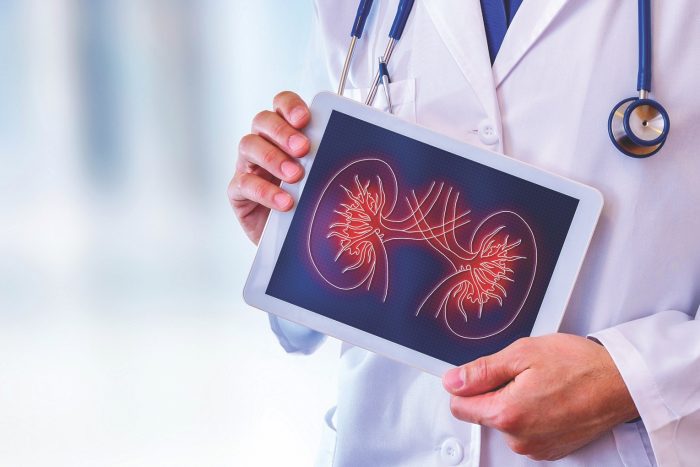Medical Compass: Tips for keeping your kidneys healthy
By David Dunaief M.D.

Your kidneys do far more than filter waste and fluid from your body. They maintain your blood’s health, help control your blood pressure, make red blood cells and vitamin D, and control your body’s acid levels. With all these functions relying on them, it’s crucial to keep them operating well.
When kidney function degrades, you can experience hypertension or cardiovascular problems. In later stages of chronic kidney disease (CKD), you may require dialysis or a kidney transplant. For the best outcomes, it’s critical to identify CKD early and arrest its progression to more serious stages. However, of the estimated 35.5 million U.S. adults who have CKD, as many as 9 in 10 are not even aware they have it (1).
Unfortunately, early-stage CKD symptoms are not obvious and can be overlooked. Among them are foamy urine, urinating more or less frequently than usual, itchy or dry skin, fatigue, nausea, appetite loss, and unintended weight loss (2).
Fortunately, simple tests, such as a basic metabolic panel and a urinalysis, can confirm your kidney function. These indices include an estimated glomerular filtration rate (eGFR), creatinine level and protein in the urine. eGFR is a calculation and, while the other two indices have varying ranges depending on the laboratory used, a patient with an eGFR of 30 to 59 is classified as having mild disease. The eGFR and the kidney function are inversely related, meaning as eGFR declines, the severity of CKD increases.
What can be done to address early-stage CKD, before you experience complications? Several studies have evaluated different lifestyle modifications and their impacts on its prevention, treatment and reversal.
What creates the greatest kidney risks?
Among the greatest risks for your kidneys are uncontrolled diseases and medical disorders, such as diabetes and hypertension (1). If you have — or are at risk for — diabetes, control your blood sugar levels to limit kidney damage. Similarly, if you have hypertension, controlling it will put less stress on your kidneys. For these diseases, it’s important to have your kidney function tested at least once a year.
In addition, obesity and smoking are risk factors and can be managed by making lifestyle changes.
How can diet help protect your kidneys?
Fruits and vegetables may play a role in helping patients with CKD. In a one-year study with 77 patients, results showed that fruits and vegetables work as well as sodium bicarbonate in improving kidney function by reducing metabolic acidosis levels (3).
What is the significance of metabolic acidosis? Body fluids become acidic, and it is associated with CKD. The authors concluded that both sodium bicarbonate and diets including fruits and vegetables helped protect the kidneys from further damage in patients with CKD. Alkali diets are primarily plant-based, although not necessarily vegetarian or vegan. Animal products tend to cause an acidic environment.
In the Nurses’ Health Study, results show that animal fat, red meat and sodium all negatively impact kidney function (4). The risk of protein in the urine, a potential indicator of CKD, increased by 72 percent in those participants who consumed the highest amounts of animal fat compared to the lowest, and by 51 percent in those who ate red meat at least twice a week. With higher amounts of sodium, there was a 52 percent increased risk of having lower eGFR levels.
The most interesting part with sodium was that the difference between higher mean consumption and a lower mean consumption was not large, 2.4 grams compared to 1.7 grams. In other words, a difference of approximately a quarter-teaspoon of sodium per day was responsible for decrease in kidney function.
The National Kidney Foundation recommends diets that are higher in fruit and vegetable content and lower in animal protein, including the Dietary Approaches to Stop Hypertension (DASH) diet and plant-based diets (2).
In my practice, when CKD patients follow a vegetable-rich, nutrient-dense diet, they experience substantial kidney function improvements. For instance, one patient improved his baseline eGFR from 54 to 63 after one month of dietary changes, putting him in the range of “normal” kidney functioning. Note that this is one patient, not a rigorous study.
How often should you have your kidney function tested?
It is important to have your kidney function checked as part of your regular physical. If your levels are low, you should address the issue through medications and lifestyle modifications to manage and reverse early-stage CKD. If you have common risk factors, such as diabetes, smoking, obesity or high blood pressure, or if you are over 60 years old, talk to your doctor about regular testing.
Don’t wait until symptoms and complications occur. In my experience, it is much easier to treat and reverse CKD in its earlier stages.
References:
(1) CDC.gov. (2) kidney.org. (3) Clin J Am Soc Nephrol. 2013;8:371-381. (4) Clin J Am Soc Nephrol. 2010; 5:836-843.
Dr. David Dunaief is a speaker, author and local lifestyle medicine physician focusing on the integration of medicine, nutrition, fitness and stress management. For further information, visit www.medicalcompassmd.com or consult your personal physician.







